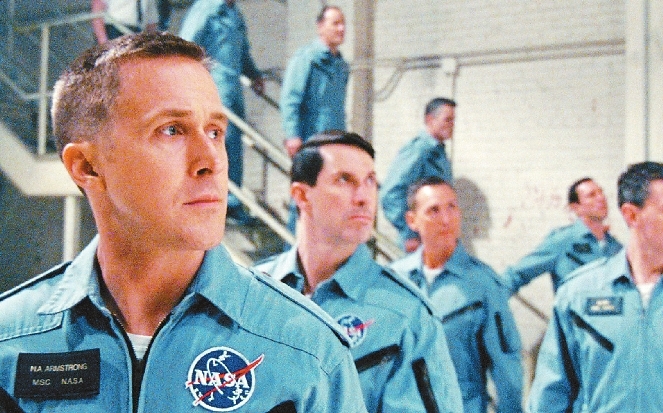

Damien Chazelle sets his sights on a place at Hollywood’s head table alongside Steven Spielberg and Christopher Nolan with this biopic of American hero Neil Armstrong (Ryan Gosling). Based on the best-selling biography “First Man: The Life of Neil A. Armstrong” by James R. Hansen, the film spans much of the 1960s, charting Armstrong’s journey from rookie* NASA recruit to history-making moonwalker. The film is peppered with satisfyingly tactile*, increasingly elaborate action set pieces, each of which serves to hammer home* just how dangerous the space race really was. But at its core, “First Man” is an intimate* epic, preoccupied above all else with Armstrong’s psyche*. Josh Singer’s economical screenplay portrays Armstrong as a reluctant* hero, and a man of few words both in private and public. The script also focuses on the death of Armstrong’s two-year-old daughter. The tragic event, which took place months before Armstrong joined the NASA Astronaut Corps, is both a source of personal pain and a motivator in the workplace. The death itself is depicted matter-of-factly, but is revisited repeatedly in flashback sequences, to the extent that it begins to feel like Armstrong’s sole defining trait. Claire Foy proves a magnetic presence as Armstrong’s wife Janet. The lighthearted moments are handled more effectively. When Janet forces her husband to prepare their kids for the possibility that he won’t return from space, the scene takes an unexpected comedic turn, with Armstrong lapsing into PR speak, addressing his young sons as if they were reporters. But such playful touches are few and far between. Perhaps the film’s greatest achievement is its un-jingoistic* appraisal of the American space program, with a strong emphasis placed on both its economic and human cost. When Chazelle widens his focus, it’s often to depict public opposition to NASA’s efforts. Meanwhile, over the course of his training, Armstrong loses numerous friends and colleagues, under terrible circumstances. SD-Agencies | 
